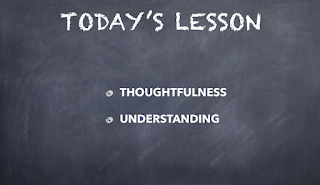THOUGHTFULNESS: A sound mind is capable of making distinctions and clarifying, capable of the various modes of discourse that we talk about so often in writing: description, illustration, persuasion, and explanation. A sound mind can make decisions, inquire, and learn how to learn. We want people to be able to practice these various aspects of thoughtfulness alone and with others, verbally and orally, in written form with multiple subjects and with a core kind of knowledge and wrong kinds of activities, given their ages.
UNDERSTANDING: Student-teacher understanding has displayed many advantages in the classroom. First, students who share a positive understanding with their teacher develop more vital social-emotional skills. In addition, these students are more likely to absorb more academic knowledge. The result of a strong student-teacher relationship is that it allows students to feel confident through exploration and taking risks in their academic tasks. In short, students with a positive student-teacher relationship demonstrate more robust performance in the classroom. However, creating an environment that incorporates mutual respect is one of the most significant impacts of a positive student-teacher relationship. One way an educator can build a strong relationship with a student is to explicitly define learning goals and expectations positively. This could look different for groups of students or individual students. The strong connection will allow educators to be aware of their student’s learning and adjust their learning goals and expectations as needed.
Similarly, the educator should enable opportunities for students of all learning styles to participate in class discussions through oral and written communication. In addition to academic advantages, positive student-teacher relationships improve mental health and assist students in developing self-worth. Often, students look up to their educators as mentors. With this in mind, students will likely feel pride when the educator encourages them in their learning and social interactions. Social competence, problem-solving abilities, autonomy, and a feeling of a bright future or purpose are protective elements that boost resilience. These all can be developed in a supportive teaching atmosphere. As noted, students benefit from positive student-teacher relationships. Likewise, educators benefit as well. While creating solid relationships with their students, educators are strengthening their own interpersonal and professional skills. Educators are more likely to respond effectively to stressful situations by improving their interpersonal communication skills. In addition, educators can form relationships with parents and coworkers. In summary, students and educators benefit from creating positive student-teacher understanding.
The Doon Girls' School

